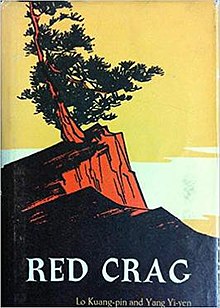Red Crag
 Cover of English translation published by Foreign Languages Press | |
| Author | Luo Guangbin and Yang Yiyan (Luo Kuang-pin and Yang Yi-yen) |
|---|---|
| Language | Chinese |
| Publication place | China |
Red Crag or Red Rock (Chinese: 红岩; pinyin: Hóngyán) was a 1961 novel based partly on fact by Chinese authors Luo Guangbin and Yang Yiyan, who were former inmates in a Kuomintang prison in Sichuan. It was set in Chongqing during the Chinese Civil War in 1949, and featured underground communist agents under the command of Zhou Enlai fighting an espionage battle against the Kuomintang.
The novel contained a highly negative portrayal for the Sino-American Cooperative Organization, as responsible for the running prisons jailing communists and other political dissidents, although in reality they were actually run by the KMT secret police service BIS, and had no American involvement.[1][2] The main protagonist Jiang Xueqin, or "Sister Jiang" (Chinese: 江姐; pinyin: Jiāng Jiě), is based on the Communist revolutionary Jiang Zhuyun (1920–1949).
Xujun Eberlein wrote in The Atlantic that "The novel played a critical role in the heroism culture of the Mao era."[3]
The book includes a poem that was attributed to, but was not written by, the revolutionary "martyr" Chen Ran (陈然, 1923-1949).[3]
Adaptations
[edit]The 1964 Chinese-language western-style opera titled Sister Jiang is based on the novel.[4][5][6][7] The opera was composed by Yang Ming and Jiang Chunyang,[8] musicians of the art bureau of the Chinese Air Force.[9][10] In 1965, a feature film adaptation directed by Shui Hua was released; titled Eternity in Flames (烈火中永生), it starred Yu Lan and Zhao Dan.[11]
In 2002, at the invitation of the German World Art Festival, director Zhang Yuan presented a Peking opera (also titled Sister Jiang), with Zhang Huoding in the title role, at the Cologne Grand Theater - the first major presentation of a revolutionary opera in Europe. Zhang Yuan made a film version of the production in 2003.
In 2004, a Peking opera titled Hua Ziliang was produced by Tianjin Chinese Opera Theater for DVD in 2004 with Wang Pin in the title role.[12] Hua Ziliang is a character from the novel.
A 2010 CCTV-1 TV series also titled Sister Jiang is also based on this novel.
References
[edit]- ^ 郑永明 (2009-08-17). "再现血雨腥风史 培育革命后来人 ——红岩档案资料的研究与开发". 中国档案报 国家档案局. Archived from the original on January 1, 2013. Retrieved 16 March 2010.
- ^ "文艺作品中与历史上的中美合作所真相". Netease. 2009-06-08. Retrieved 16 March 2010.
- ^ a b Eberlein, Eberlein. "Another Kind of American History in Chongqing, 1: Prologue" (Archive). The Atlantic. January 31, 2011. Retrieved on December 20, 2015.
- ^ East Asian History - Institute of Advanced Studies, Australian National University, 1998 p134-137
- ^ Chongqing & The Three Gorges Kim Hunter Gordon, Jesse Watson Page 97 "... including the child Xiao Luobo tou, were executed by gunshot. The dead included Jiang Zhuyun, later known as sister Jiang, who became the most famous of the revolutionary martyrs killed that day, with a revolutionary opera recounting her story."
- ^ Shades of Mao: the posthumous cult of the great leader Geremie Barmé - 1996 Page 176 ""Sister Jiang" (Jiangjie) is a pre-1966 opera about the Sichuan revolutionary martyr Jiang Zhuyun. It is based on the novel Red Crag (Hongyan)"
- ^ World Encyclopedia of Contemporary Theatre: Asia/ Pacific - Page 140 Series Rubin - 1998 "Western-style opera (also known as High Opera) exists alongside the many Beijing Opera groups. The Central ... Operas of note by Chinese composers include A Girl With White Hair written in the 1940s, Red Squad in Hong Hu and Jiang Jie."
- ^ A Critical History of New Music in China - Page 346 C. C. Liu - 2010 -"... Jiang jie [Sister Jiang] by Yang Ming and Jiang Chunyang"
- ^ Daily report: People's Republic of China United States. Federal Communications Commission. Foreign Broadcast Monitoring Service, United States. Foreign Broadcast Information Service - 1991 Page 117 "The modern opera "Sister Jiang" was first produced and performed by the theatrical troupe under the Air Force's political department in the early sixties. It caused a sensation throughout the country. In particular, the song "Ode to The Red ..."
- ^ Some of us: Chinese women growing up in the Mao era Xueping Zhong, Zheng Wang, Bai Di - 2001 - Page 122"I always thought a mentor should be more like Sister Jiang, a highly cultured lead female character in a revolutionary opera. Jiang sister is tall with refined manners and wears a dark-blue Chinese qi pao dress and a red scarf draping her"
- ^ Xiao, Zhiwei (1998). "Red Crag". In Zhang, Yingjin; Xiao, Zhiwei (eds.). Encyclopedia of Chinese Film. New York, London: Routledge. p. 279. ISBN 978-0-415-15168-9.
- ^ Tianjin Statistical Yearbook 2004 Page 31 7503743220 2004 The city performed Peking opera "Hua Ziliang", ballet opera "Jingwei" and drama "Applause for you" .
